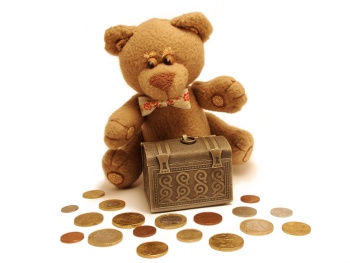Kids and Money: Teaching Your Child about Money Management
In this section of our finances directory we look at Kids and Money, and offer some simple tips for teaching your child about money management
In this day and age, it has become too common for people to buy things now using credit, and to pay later.
Just think of all the people you know who are deep in debt. You may even be one of them.
Credit cards were introduced to America in the 1950's, and since then, they have resulted in a lot of financial problems for millions of people.
It is estimated that over 40% of American families are spending more than they earn from their jobs.
So if adults are not doing such a good job of managing their money, how can we expect the children of tomorrow to manage theirs? Fortunately, there is still time to help your children out.
Teaching your children how to manage their money is something that should begin early, and can help prevent the debt that many adults find themselves in much too soon.
In what follows in this guide, are tips and advice to help teach your children the value of money, and how to earn it and use it.
Only then, can they grow into responsible adults with an appreciation of what money is, and how to use it wisely.
Then when they move away from home, you can rest assured that you have taught them what they need to know about money.
Just remember that you, the adult, also need to practice what you preach.
After all, your children see what you do, and act accordingly.
Therefore, it is important to understand that you will be modeling money management skills.

So what is one of the first things you need to teach your children about money?
That would be the difference between a "want" and a "need."
You can begin explaining this as early as when your children are preschoolers. T
he amount of detail discussed will vary and change depending on the ages of your children.
A "want" is something that you would like to have, but you do not need it to live.
For example, you might want a video game, but it is not necessary in order to live.
A "need," on the other hand, is something that without it, you cannot survive.
For example, you need food, water, shelter, and clothing.
To make things a bit more confusing, the two terms sometimes overlap.
Therefore, you need to explain this to your children as well.
For example, although you need clothing, you do not need brand-name labels. That, instead, is a want.
The same thing applies to junk food.
You need healthy foods, but you do not need junk food.
Again, that is also a want.
As they learn to manage their money as they get older, you can teach them that it is okay to have some wants, but that they need to balance it with their needs and true financial situation.
What are some ways that you can teach your children the difference between a "want" and a "need?"
* When you are shopping with your children, ask them the question, "Is this a want or a need?"
Then get them to explain why they made that choice. Discuss it in further detail.
* When you are paying your bills, ask them which ones are "wants" and which ones are "needs."
For example, a water bill is a "need."
Without it, you have no water to drink, cook with, bathe in, or do your laundry.
On the other hand, a cable bill is definitely a "want."
Now, you can apply these terms as you teach your children strategies to manage their money.
The Five Strategies to Teach your Children:

1. Earn
2. Save
3. Spend
4. Donate
5. Invest
The way you address each stage is dependent on the age of your child, but needs to begin early.
So let's talk about each of these strategies in a bit more detail.
Earning
Earning an allowance is one of the earliest ways that you can teach your children that when they work, they earn money.
Some parents are against giving an allowance, because they feel that their children make up part of the household and should not be paid for performing tasks that are required be done by all members of the family.
However, providing your children with an allowance for tasks they have completed, is one of the best ways that they can learn from an early age how adulthood works.
After all, a seven-year-old cannot exactly get a regular job to pay for a toy he wants to buy.
However, if he has to earn the money by working for it, and saving for it, he learns how much time and effort he has to put in to get that toy.
In addition, that same child is likely to take better care of the item he purchased with his own money, compared to parents simply purchasing it for the child with their own money.
With smaller children, you can begin with simple tasks like making their beds before they go to school in the morning, or feeding the family cat.
With older children, you can get them to clean a bathroom, vacuum, and unload the dishwasher.
It is helpful to create a Monday-Sunday chart that lists what is expected of them every day, and when they have completed the tasks, they check them off. Each chore can have a set monetary value.
Incomplete chores at the end of the week can result in deductions.
You can even give bonuses if chores are completed all week without reminders.
At the same time, you are teaching them to be responsible for remembering what they are supposed to get done.
As your children become teens, you can also teach them about starting their own businesses such as doing lawn care or running errands for elderly people.
This way, you are also teaching them the entrepreneurial part of earning a living.
Saving
The way you save is by spending less money than you earn. You can teach your children that saving allows you to forego the short-term desires for something more long-term. This also helps teach patience and impulse control.
For example, you may want to teach your children that they can buy this tiny toy today (which is not what they really want) or they can save their money up for that big Lego set that they have had their eye on for quite some time.
So how do you save?
A great way for your younger children to begin saving is by setting up cute piggy banks in their bedrooms where they can see the money that is being saved.
You may even want to open up their first savings accounts at a bank.
Although interest rates are not that high at this time, there can be great satisfaction in seeing the account increase over time.
This also allows them to keep track of how much more they need to save in order to buy those items that they have been saving up for.
Another important aspect of saving is to teach your children to "pay yourself first."
That means automatically putting money away that is for savings, and not spending all of it.
Sometimes, this will overlap with investing, which will be discussed later.
Spending
There is no doubt that spending is helpful to the economy, but you need to teach your children that they cannot spend more than they earn.
That is the sure way to accumulating debt, and a life of financial hardships.
First, it is recommended that you ensure your children are spending money, and not using credit cards, bank debit cards, or even gift cards.
The credit card companies are sneaky. For example, you can buy credit cards that you preload.
Then all the parent does is pay an activation fee to the credit card company, and the children go to the store and use the cards to buy what they want.
Ask your friends and family that they instead give money instead of these cards.
The reason for this is that using money has the added advantage of allowing your children to learn how to count money, and get change when being a customer.
In addition, studies have shown that money that is handled has a more emotional impact on consumers than using a card (credit, debit, gift), and that people who use credit cards are more likely to overspend and buy impulsively than those using cash.
In other words, when you see that you have $20 left in your wallet, you are more likely to think harder about what you spend it on than if you just hand over a plastic card.
This is because it is psychologically more difficult to hand over cash than it is to swipe your credit card, for example.
So now what can you do to ensure your kids are spending their money wisely?

1. Teach them about buying items on sale
Teach your children that you do not necessarily have to sacrifice quality if you wait until things go on sale.
Then you can buy more for less, or spend less, and save the rest of the money for something else.
2. Teach them about impulse buys
Teach your children how stores are very crafty in how they set up their aisles, and the area near the checkout counter, as they hope you will make some impulse buys on your way out.
Furthermore, teach them that it is best to make a list before going shopping to avoid those impulse buys.
Another method to teach is that if you see something at the store that you did not intend to purchase before leaving the house, to learn to walk away.
More often than not, you will forget about it by the time you leave the store or get home, thus saving yourself from an impulse buy.
Lastly, it is also helpful to teach your children that spending can be curbed by not visiting stores that tempt you.
For example, for children, that may be a toy or candy store.
Let them know that you avoid visiting the mall, because it tempts you to buy clothing that you do not need.
3. Tell them how much something costs
If you simply tell your children that something is too expensive, they will not necessarily understand what that means.
Therefore, it is helpful to teach them that, "this small Lego toy is $15, but this large Lego set is $80."
When your children are earning their own money through an allowance, for example, then they will start to understand what it means when you tell them the price of something.
After all, they will remember how much they had to work to earn that particular amount of money.
Kids and Money - Donating
It is never too early to teach your children about donating.
Many families choose which charities they would like to donate their time and money to, and in turn, can teach their children a lot about the importance of giving to causes that are dear to their hearts.
There are a couple different methods for teaching your children about donating and money-management:
* Donating their own money
Your local animal shelter may be a great place to begin with your children. This is especially true if your children have their own pets, and are animal lovers.
Many shelters require children to be sixteen or older to volunteer their time, but you can also teach them that they can help in other ways such as making donations of their money.
You can even provide more incentive by suggesting that if your children save up and donate "x" amount of money, that you will double the amount for donation.
* Donating their time
It is not unusual to hear of children in the news who give of their time in order to create profits that are then donated to charities of their choice.
For example, children who are interested in conservation efforts, may use their artistic talents to create magnets that they sell to the public.
The profits are then donated to the cause or charity.
This adds another bonus of being able to teach your children about how much it costs to buy the materials to create the magnets, and then what the actual profits are once the costs are taken into consideration.
Kids and Money - Investing

What exactly does this word mean anyway?
It is learning how to put your money to work for you.
As Warren Buffet says, "The more you learn, the more you'll earn."
Unfortunately, too many people are taught that you make money by trading hours for dollars.
This can be true, but there are only so many hours in a day, and you do need to sleep some of them too. In addition, you can only ever earn as much as your job is worth.
This is where teaching your children about investing is important.
It provides them with another way to earn money without having to work more hours to get it.
It is a fact that many households are not investing.
There are a number of children whose parents have not invested money into RESP's (Registered Education Savings Plans).
Studies are also finding that high numbers of people are not prepared for retirement.
If you do not know a lot about investing, it is wise to start learning so that you can impart that information to your children too.
You do not want them to have to rely solely on a financial advisor or bank manager to tell them how they should invest their money.
Instead, if they learn some of the terminology (stocks, bonds, mutual funds, etc), and how to track their investments, you will be providing them with a huge advantage in years to come.
More and more, the reliance on governments to provide old-age pensions in the future is questionable.
It is very possible that these programs will not be there for your children.
Important!
Teaching your children how to manage their money is something that should begin early, and can help prevent the debt that many adults find themselves in much too soon.
Continue to Research
Teaching your children about money management involves teaching them about earning, saving, spending, donating, and investing.
By doing this, you are setting up your children for a future of financial responsibility and success in this area of their lives.
A lot of times, kids being wasteful is the result of a lack of knowledge or understanding about what things cost and what it means to earn money to buy things.
The sooner your kids understand the value of money, and start to earn their own pocket money that they have to learn how to manage, the sooner your kids will be on the road to growing up into adults who are financially well educated and secure.
More Resources
Here are some products about Kids and Money you can buy online that I think look very useful to help your child to manage money better:
Below here I'm featuring more pages with helpful how-to-do-it tips on this subject.
Feel free to submit your own story or article about it, and I will create your own page here with your contribution for the community to read.
More Tips for How To Do It Yourself: Money Matters
Do you have a tip you want to contribute here? Share it!
Read the latest updates & rest of the how-to tips here:
Click the Title links below to see the latest how to do it tips and contributions to this page...
5 Profitable Online Business Ideas for Teens
Teenagers today have various modern skills that the business world may use. For a kid, starting one of these internet businesses can be terrifying, but …
How to Invest: 6 Tips for Teens
There’s a famous saying that says, “The best time to plant a tree was fifty years ago, the second best time is today.” Investing is very similar. The …

"Power Tips" magazine is back!
You Get A Free Complete Self Help Report delivered to your email box every edition, plus you get a free PLR article and other great gifts!
SUBSCRIBE BELOW ... I promise you will want to USE what you learn!
I really want to know what you think of this site, this page, and to hear your tips or suggestions about it.
So please share your story or simply add a Comment in the comment box.
If you feel that the information on this page has been useful to you please give it a Like or share it with your friends - thanks!!
"You are a life Saver!!
I recently discovered this site and I can tell you that my life has not been the same. I now come here EVERYDAY and spend at least 1 hour.
I used to spend that time browsing online fashion and beauty
magazine which just means that I spend more. Now I have replaced that
habit with coming here.
In future I will think about contributing articles as well. Thank you! Thank you!! Thank you!!! and God bless"
Contact Us | About Us | Terms of Use | Privacy Policy | FAQ | Testimonials
Amazon and the Amazon logo are trademarks of Amazon.com, Inc. or its affiliates. As an Amazon Associate I earn from qualifying purchases. Product prices and availability are accurate as of the date/time
indicated and are subject to change. Any price and availability
information displayed on [relevant Amazon Site(s), as applicable] at the
time of purchase will apply to the purchase of this product.
Back to HOME PAGE of this kids and money management section of the site.


















New! Comments
Have your say about what you just read! Leave me a comment in the box below.